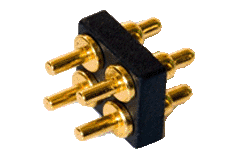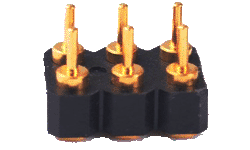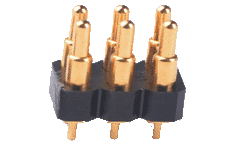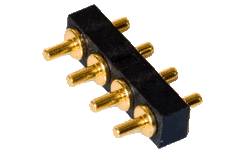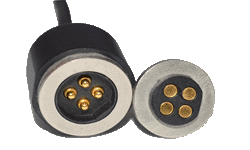2025-9-11 9:49:03
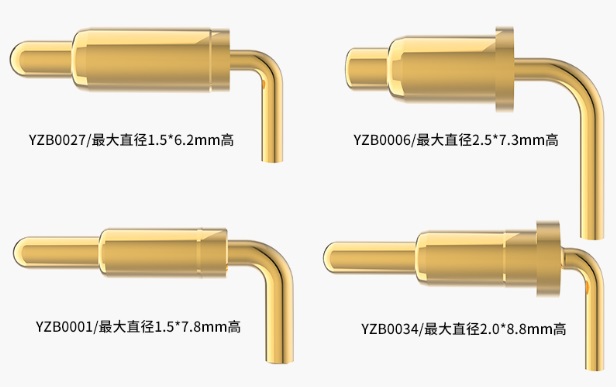
Packing Right Angle Pogo Pins
Proper packing of right angle pogo pins is critical to preserving their functionality, precision, and structural integrity during storage, transportation, and handling. These specialized connectors—used in applications ranging from electronics testing to industrial machinery—feature a spring-loaded pin mechanism housed in a right-angled housing, making them susceptible to damage from physical stress, contamination, or misalignment. Below is a detailed, step-by-step guide to packing right angle pogo pins effectively.
1. Pre-Packing Inspection
Before packing, conduct a thorough inspection of each pogo pin to ensure they meet quality standards and are free from defects that could worsen during transit. Check for:
- Physical Damage: Bent pins, cracked housings, or deformed springs. Even minor bending can compromise electrical conductivity or mechanical performance.
- Contamination: Dust, oils, or debris on the pin tip or within the spring mechanism. Use compressed air or a lint-free cloth lightly dampened with isopropyl alcohol to clean components if necessary.
- Spring Functionality: Verify that the pin retracts smoothly and returns to its extended position without sticking. Sticky or unresponsive springs may indicate internal debris or manufacturing flaws.
Separate defective units from functional ones to avoid mixing, and document any issues for quality control purposes.
2. Selecting Packaging Materials
Choose materials that provide cushioning, insulation, and protection against static electricity, moisture, and physical impact:
- Anti-Static Packaging: Right angle pogo pins are often used in electronics, so static discharge can damage sensitive components. Use anti-static bags, trays, or bubble wrap marked with ESD (Electrostatic Discharge) certification. These materials dissipate static charges to prevent arcing.
- Cushioning Materials: Opt for soft, non-abrasive materials like polyurethane foam, silicone sleeves, or polyethylene (PE) foam. Avoid rigid plastics or rough fabrics that could scratch pin surfaces or compress springs.
- Moisture Barriers: In humid environments or for long-term storage, include desiccant packs (silica gel) to absorb moisture. Seal components in moisture-resistant bags or containers to prevent corrosion, especially for pins with metal surfaces.
3. Individual vs. Bulk Packaging
The choice between individual and bulk packaging depends on the quantity, application, and handling requirements:
- Individual Packaging:
For high-precision or small-batch pogo pins, package each unit separately to prevent contact and friction.- Place each pin in an anti-static bag or a custom-fit foam slot. For right angle designs, ensure the 90-degree bend is supported to avoid stress on the housing.
- Seal bags tightly with heat-sealing equipment or adhesive strips to prevent dust ingress. Label each bag with specifications (e.g., part number, length, spring force) for easy identification.
- Bulk Packaging:
For larger quantities, use divided trays or compartments to separate pins.- Select trays with rigid, ESD-safe plastic dividers sized to fit the pogo pins snugly. The compartments should prevent movement during transit—too much space can cause pins to collide, while overly tight spaces may bend pins or compress springs.
- Layer trays with foam sheets between levels to add cushioning. Cover the top tray with a foam pad before sealing the container to prevent shifting.
4. Securing and Sealing Containers
Once pogo pins are placed in their respective packaging, secure them in outer containers to withstand shipping conditions:
- Outer Containers: Use sturdy cardboard boxes or plastic crates with reinforced corners. Line the bottom and sides with foam sheets or bubble wrap for additional shock absorption.
- Internal Bracing: Fill empty spaces in the container with packing peanuts (preferably anti-static) or air pillows to prevent movement. Avoid overpacking, as excessive pressure can deform the inner packaging.
- Sealing: Close boxes with heavy-duty packing tape, applying strips along all seams to reinforce the structure. For plastic crates, use latches or straps to ensure a tight seal.
5. Labeling and Documentation
Clear labeling ensures proper handling and traceability:
- Handling Instructions: Mark boxes with labels such as “Fragile,” “This Side Up,” and “Do Not Stack” to guide handlers. Include ESD warnings if applicable (e.g., “Ground Before Opening”).
- Product Information: Label each container with part numbers, quantities, batch codes, and manufacturing dates. Attach a packing list detailing contents for inventory checks.
- Shipping Details: Include recipient information, return addresses, and any regulatory labels required for hazardous materials (if applicable, though pogo pins are typically non-hazardous).
6. Storage and Transportation Best Practices
- Storage Conditions: Store packed pogo pins in a dry, temperature-controlled environment (ideally 15–25°C with 30–60% humidity). Avoid direct sunlight, extreme temperatures, or areas with high vibration.
- Transportation: Choose reputable carriers with experience in handling electronic components. For international shipments, comply with IATA or IMO regulations for packaging and labeling. Track shipments to monitor handling and address delays promptly.
7. Unpacking Guidelines for Recipients
Include a brief guide for recipients to ensure proper unpacking:
- Advise grounding oneself before opening ESD packaging to prevent static damage.
- Instruct recipients to inspect pins immediately upon unpacking and report any damage to the supplier.
- Recommend storing unused pins in their original packaging to maintain protection.
By following these steps, manufacturers, distributors, and end-users can ensure that right angle pogo pins remain in optimal condition, ready for reliable performance in their intended applications. Proper packing not only minimizes the risk of damage but also streamlines inventory management and reduces costly replacements.

